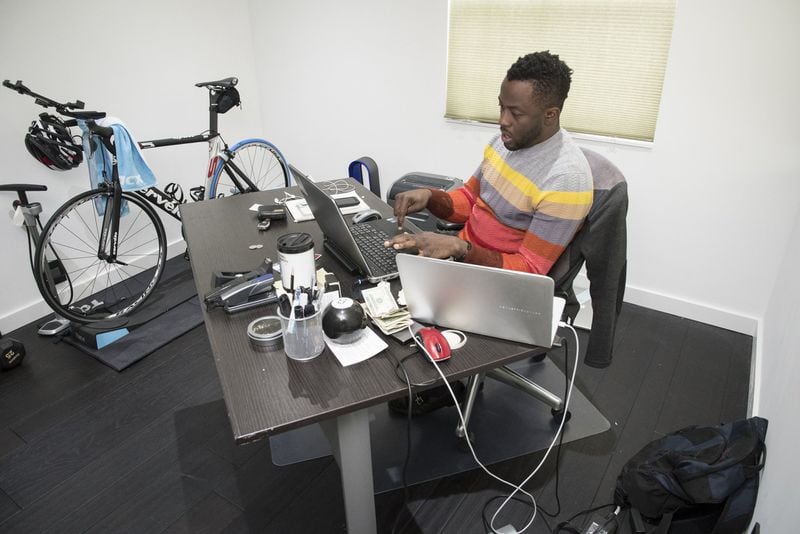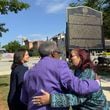Banji Oyebisi felt a heavy weight lift off his shoulders when he learned he had won America’s diversity visa lottery. His native Nigeria beset with political upheaval and violence, Oyebisi immigrated to Georgia in 1996 and worked his way up from washing dishes to employing four people at his own technology consulting business in Sandy Springs.
The program that brought Oyebisi to America is now drawing intense scrutiny following a truck attack that killed eight people on a New York City bike trail on Halloween. The 29-year-old Uzbekistani immigrant accused of mowing the people down came to the U.S. seven years ago on a diversity visa.
President Donald Trump is calling for the visa lottery to be scrapped in the wake of the massacre, citing security concerns.
“Diversity lottery — sounds nice, it’s not nice,” the president told reporters this month, calling the suspect in the attack — Sayfullo Saipov — an “animal.” “It’s not good. It hasn’t been good. We’ve been against it.”
But proponents of the program say it upholds America’s melting pot ethos while boosting this nation’s standing in the world. Its critics, they say, are unfairly painting diversity visa recipients with a broad brush and overlooking the contributions Oyebisi and others are making here.
A philosophical man with a radiant smile, Oyebisi grew up amid a brutal dictatorship in Nigeria. He came from Ejigbo, a rural town about 130 miles northeast of Lagos. His family’s apartment had no indoor plumbing, and neighbors lived in earthen homes. Oyebisi recently imagined what his countrymen would say about his journey to the United States, a nation he calls a “beacon of hope.”
“That is Banji over there,” said Oyebisi, now a naturalized U.S. citizen. “He went to America. Look at his life today. I guess if I stay in school and I am persistent and do not do criminal things, I could be like that someday. My kid could be like that someday.”
Signed into law in 1990 by President George H.W. Bush, the visa lottery was originally aimed at helping Irish immigrants fleeing economic crisis. Now the largest share of people coming to America through the program are Africans such as Oyebisi. Each year, about 50,000 visas are made available through the program, contributing just 5 percent of the roughly 1 million immigrants who come here annually.
The lottery is designed to diversify America, so no country may receive more than 7 percent of the available visas each year. Demand for them is extraordinarily high. In fiscal year 2015, for example, 14.4 million people registered for the chance to apply for them. Registration is free, and winners are selected through random computer drawings. To be eligible, applicants must either have at least a high school education or its equivalent, or two years of recent work experience. They must also demonstrate they can support themselves here.
In August, Georgia U.S. Sen. David Perdue introduced legislation — with Trump’s backing — that would end the lottery and shift the country’s immigration system to emphasize a merit-based approach. The hope is that it would attract the best and brightest to America. But lottery supporters say it is bringing in people who are making big contributions here. They point to two lottery winners: French native Greg Dubos, a Georgia Tech graduate, who is now working with NASA’s Mars Science Laboratory mission; and Derreck Kayongo, a former Ugandan refugee who now leads the National Center for Civil and Human Rights in Atlanta.
Like Trump, Perdue is raising safety concerns in the wake of the New York truck attack. He recently pointed out that some of the visas are going to people from Iran, which the U.S. State Department has designated as a state sponsor of terrorism. In fiscal 2015, Iran ranked third among countries nationwide for the total number of applicants who were selected to apply for diversity visas at 4,992. Cameroon and Liberia tied for first at 5,000 each.
Iranian native Seyed Ali Sepehr, who came to American with a diversity visa in 2011, pushed back against Perdue’s criticism. Sepehr now resides in Los Angeles, where he operates a nonprofit organization that helps fellow Iranians apply for the same visas. Some of them, he said, have settled in the Atlanta area.
“I know a lot of people who came here and they are doctors right now. They are engineers. They are lawyers,” he said. “Iranians are not terrorists.”
Between 1975 and 2015, no one from Iran killed any Americans in terrorist attacks on U.S. soil, according to a report released this year by the Cato Institute, a libertarian group based in Washington. Further, a 2007 U.S. Government Accountability Office report found no evidence diversity visa recipients posed threats. But it also concluded the program is vulnerable to fraud, citing reports of fake documents, sham marriages and “visa agents” in Bangladesh who have intercepted applicants’ records and charged ransoms of up to $20,000.
The Trump administration recently announced it is seeking to strip four Minnesota residents of their U.S. citizenship, alleging the Somali natives lied about being part of the same family so they could immigrate to the U.S. through the lottery program and become naturalized citizens.
“This diversity lottery has been abused,” Perdue said. “It’s fraudulent.”
The senator is hoping parts of his legislation, including a provision that would eliminate the diversity lottery, will end up in a broader deal over the legal status of so-called “Dreamers,” or immigrants who were brought to the U.S. as young children without authorization.
“Look, we’re doing things in here the Democrats have wanted,” Perdue said.
Many Senate Democrats voted to end the visa lottery back in 2013 as part of a larger bipartisan immigration overhaul. But there’s also a core group of Democrats, particularly in the House, who are pushing to keep the program in place. Members of the Congressional Black Caucus have been particularly vocal about maintaining the lottery in previous years, citing how it opens the door to immigrants from Africa and the Caribbean. One of those caucus members — U.S. Rep. John Lewis, an Atlanta Democrat — was an original co-sponsor of the bill that created the program.
“I don’t see any reason why we should get rid of it,” he said. “Our country is built on diversity.”
Yusuff Kosoko came to the Atlanta area in 2007 from Nigeria on a diversity visa, then brought his wife over in 2012. Now living in Baltimore, they routinely send money back to relatives in Nigeria.
“Most of the time I do two jobs and am helping my family back at home,” said Kosoko, a naturalized citizen who works at a Walmart and is preparing to go into the security industry. “A lot of people have benefited from me being here.”
Congressional Republicans are questioning whether the lottery program’s screening process is strong enough to block troublemakers. Oyebisi said he endured a rigorous, yearlong vetting process before he was allowed to set foot in America. He remembers scrambling to gather copies of his birth certificate, school transcripts and bank statements. He submitted to multiple interviews with U.S. authorities in Nigeria. They took his fingerprints and ran a background check on him.
Oyebisi arrived in Atlanta in 1996, moving in with a fellow Nigerian immigrant in an apartment off Buford Highway and enrolling at Georgia Perimeter College before transferring to Georgia Tech. He supported himself working as a cashier at a local pharmacy and then by making calls for a debt collection agency. At one point, he struggled to pay his rent and broke down sobbing. Determined to succeed, he got a loan, bought some books and a computer, and taught himself how to write code. Meanwhile, he paid his bills by washing cars for a rental car agency and washing dishes and waiting tables at a steakhouse.
Oyebisi eventually began landing coding jobs. Now 45, he dreams of expanding his own business and starting a family. Whenever he feels discouraged, he peers into his closet in Sandy Springs. That’s where he keeps the small brown suitcase in which he carried his meager belongings — a couple of shirts, some pants and his travel documents — from Nigeria two decades ago. It reminds him of how far he has come.
“This is all I had. Not a whole lot,” he said as he zipped open the suitcase in his kitchen. Then he beheld his stylish and sparkling home. “It’s just amazing.”
---------------------------------------------
Regions ranked by numbers of applicants selected to apply for diversity visas in 2015
Africa: 58,000
Europe: 40,000
Asia: 20,002
South America, Central America and the Caribbean: 3,999
Oceania: 3,499
North America (Bahamas): 14
Top 10 nations ranked by numbers of applicants selected to apply for diversity visas in 2015
Cameroon: 5,000
Liberia: 5,000
Iran: 4,992
Nepal: 4,991
Egypt: 4,988
Ethiopia: 4,988
Democratic Republic of Congo: 4,943
Ukraine: 4,679
Uzbekistan: 4,368
Russia: 4,103
Source: U.S. State Department









